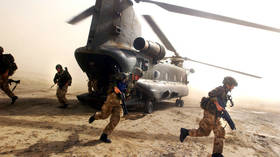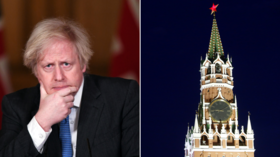By increasing its nuclear weapon stockpile, ‘hypocritical’ UK is violating 50-year-old non-proliferation treaty — Russian senator

Britain's move to grow its stockpile of warheads by 40% is a violation of the Treaty on the Non-Proliferation of Nuclear Weapons. That's according to Konstantin Kosachev, the vice chairman of Russia's senate.
Last week, London announced that it would be ending its policy of gradually reducing its number of nuclear missiles. Later, on the BBC’s Andrew Marr Show, UK Defense Minister Ben Wallace revealed that 10 Downing Street took the decision in response to Russia investing “strongly in ballistic missile defense,” noting that Britain needs to have a credible deterrent.
“This decision by itself is a clear violation of the non-proliferation treaty and many other agreements that prescribe only the reduction of the number of nuclear warheads,” Kosachev wrote on his Facebook page. “The [British] strategy calls for a 40% increase in the country's nuclear capabilities.”
Also on rt.com Boris Johnson’s military spending boost makes London look aggressive & hostile; new measures play into hands of Moscow hardlinersThe Nuclear Non-Proliferation Treaty was agreed in 1968 and came into force in 1970. Among other things, the signatories pledged that they would undertake good-faith efforts to achieve complete disarmament.
After last week’s comprehensive spending review, London announced it would be increasing its number of missiles from 195 to 260. Although a significant expansion of the arsenal, the British stockpile will still be smaller than those of Russia, America and France.
“All along, Westerners have been hypocritically arguing that, first, their missile defense systems had nothing to do with strategic nuclear weapons, and second, that these systems were in no way directed against Russia,” Kosachev added. “So when did Britain lie, Mr. Secretary, then or now?”
The politician was referring to the NATO missile defense system in Europe, which the US-led bloc has repeatedly claimed is not aimed explicitly at Moscow.
Following the announcement, Kremlin spokesman Dmitry Peskov told the press that London’s decision “harms international stability and strategic security.”
“Yet again, an ephemeral threat from Russia was voiced as justification,” he noted. “Russia is not a threat, but the buildup of warheads is something that endangers peace all over the world.”
While the US and Russia are part of the New START arrangement, a bilateral treaty with restrictions on nuclear weapons, the UK is not bound by these rules. According to Russian Foreign Ministry spokeswoman Maria Zakharova, extra weapons in the hands of Washington’s allies affects the Russian-US strategic balance.
“The decision of the UK leadership emphasizes a long-felt need for involving American nuclear allies in efforts to reduce nuclear weapons,” Zakharova said.
Like this story? Share it with a friend!













